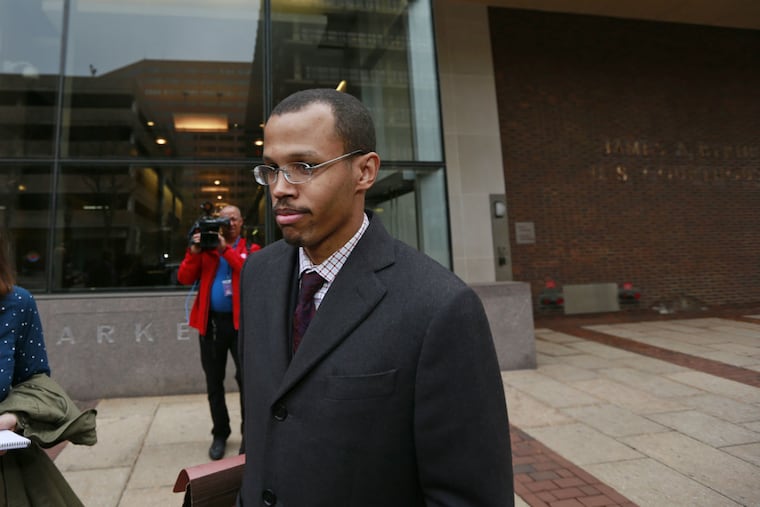Chaka Fattah Jr. gets 5 years in prison, ordered to pay $1.1 million restitution
Before being sentenced Tuesday to five years in prison and ordered to pay more than $1 million restitution to the clients and banks he defrauded, Chaka "Chip" Fattah Jr. told the court that the government had gotten it wrong.

Before being sentenced Tuesday to five years in prison and ordered to pay more than $1 million restitution to the clients and banks he defrauded, Chaka "Chip" Fattah Jr. told the court that the government had gotten it wrong.
That argument clearly went nowhere.
U.S. District Judge Harvey Bartle III ordered that the congressman's son be immediately taken into custody. He was hauled away while his father, U.S. Rep. Chaka Fattah (D., Pa.), his mother, and a sister sat in the gallery.
Earlier, the younger Fattah, acting as his own attorney, as he had at trial last fall, argued during an hour-long sentencing hearing that the government had misinterpreted things, had improperly gotten the media involved in his life, and had ruined his life.
"I didn't know anything I did was a violation of the law," Fattah said. The judge disagreed.
"Mr. Fattah, you had many opportunities and advantages that most young people could only dream about," Bartle said. "You made a plethora of bad choices of your own free will."
The judge said the government had proved that he had defrauded banks, clients, and the Philadelphia School District out of a total of $1.1 million.
The evidence against Fattah, 33, was "overwhelming," Assistant U.S. Attorney Paul Gray said, calling him "a fraudster obsessed with wealth and material possessions."
The tall, lanky, and bespectacled Fattah, who did not finish college and is not a lawyer, contended he did not know what he did was wrong.
"Despite these convictions, I try my best to be a law-abiding citizen," he said, his back to the gallery. "I never had any criminal matter before this case.
"I don't think I can survive an incarceration term, but I will try my best," he added.
He also said he had suffered much.
"I lost my apartment [at Residences at the Ritz-Carlton]. . . . I lost my friends. I've lost money and my reputation, which was good. . . . I have seriously suffered prior to going to trial in this case."
In November, a jury convicted Fattah of 22 counts of bank and tax fraud, and the judge reminded him of that.
Fattah, dressed in a gray suit and black leather shoes, did not show any reaction when Bartle announced his sentence. Besides five years in prison, Bartle sentenced him to five years' supervised release.
Fattah asked the judge whether he could turn himself in to authorities to begin his prison sentence at a later date - as is often allowed in the federal system with nonviolent criminals.
But Bartle ordered Fattah taken "immediately into custody."
Fattah, who has always been polite with the judge, softly said: "No problem."
Two deputies with the U.S. Marshals Service then went up to Fattah, as Fattah handed over his personal possessions to his backup counsel, Nina C. Spizer of the federal defenders' office.
One deputy marshal cuffed Fattah's hands behind his back, and he was led away without being given a chance to talk with his father; his mother, Michelle Wingfield; or his sister, Fran.
The congressman's wife, NBC10 news anchor Renee Chenault-Fattah, was not in the courtroom. She is on leave from her anchor job.
Fattah has said he will appeal his conviction and sentence.
The elder Fattah, 59, faces his own corruption trial before Bartle on May 2.
The congressman, who represents parts of Philadelphia and Montgomery County, is charged with misusing federal grant funds, charitable gifts, and campaign donations under his control to pay off debts and enrich himself and others - charges he has repeatedly denied.
Outside the federal courthouse Tuesday, he blamed the Inquirer and the FBI for his son's problems. He specifically blasted an article about the Feb. 29, 2012, raid by FBI and IRS agents of his son's Center City condo.
The elder Fattah said contacts between the Inquirer and the FBI and the articles published about his son made it "impossible" for him to have a fair trial.
Inquirer editor William K. Marimow has defended the newspaper's reporting, calling it "of the highest caliber."
During Fattah's trial, Gray and co-prosecutor Eric Gibson presented evidence that Fattah and his former roommate, Matthew Amato, received fraudulent bank loans in 2005 and spent the money on personal expenses, including a $45,000 BMW.
Even when Fattah earned a paycheck from 2009 to early 2012 while working with Delaware Valley High School, a for-profit company that ran alternative schools for at-risk youths with federal funds from the School District, he failed to pay his taxes, prosecutors showed. And he inflated DVHS budgets to the school district, pocekting some of the money that was to be used for counselors and other staff to benefit himself, they showed.
Amato, 33, of Broomall, who pleaded guilty in August 2014 to making false statements to obtain bank loans and testified for the prosecution, is to be sentenced Wednesday.
215-854-2592@julieshawphilly